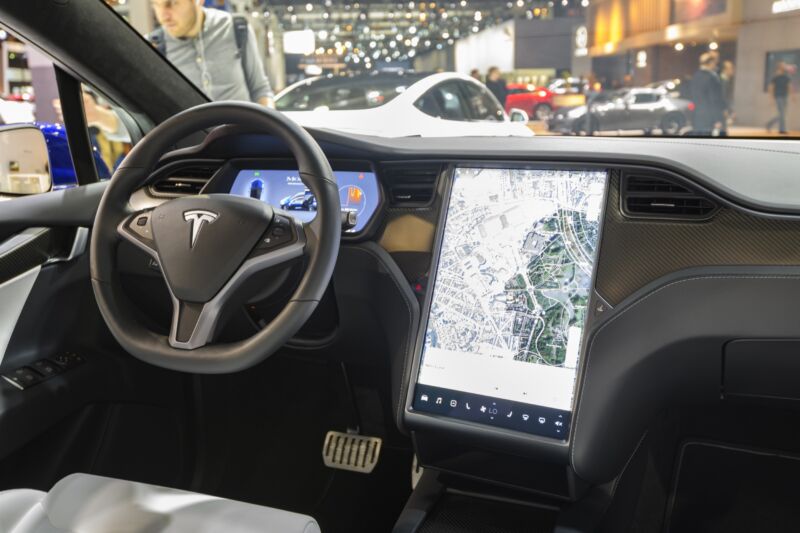
From 2019 to at least mid-2022, Tesla employees used an internal messaging system to share “sometimes highly invasive videos and images recorded by customers’ car cameras,” according to a lengthy Reuters report based on interviews with nine former Tesla employees.
Although Tesla says its in-car cameras are “designed from the ground up to protect your privacy,” today’s Reuters report described employees as having easy access to the cameras’ output and sharing that freely with other employees:
Some of the recordings caught Tesla customers in embarrassing situations. One ex-employee described a video of a man approaching a vehicle completely naked.
Also shared: crashes and road-rage incidents. One crash video in 2021 showed a Tesla driving at high speed in a residential area hitting a child riding a bike, according to another ex-employee. The child flew in one direction, the bike in another. The video spread around a Tesla office in San Mateo, California, via private one-on-one chats, “like wildfire,” the ex-employee said.
There were “pictures of dogs and funny road signs that employees made into memes by embellishing them with amusing captions or commentary, before posting them in private group chats.” Some posts could be seen by “scores” of employees.
One former employee reported seeing “scandalous stuff,” including “scenes of intimacy but not nudity,” as well as “certain pieces of laundry, certain sexual wellness items… and just private scenes of life that we really were privy to because the car was charging.” Meanwhile, one “former employee saw nothing wrong with sharing images, but described a function that allowed data labelers to view the location of recordings on Google Maps as a ‘massive invasion of privacy.'”
As Reuters notes, Tesla’s customer privacy notice says that “camera recordings remain anonymous and are not linked to you or your vehicle.” But seven ex-employees “told Reuters the computer program they used at work could show the location of recordings—which potentially could reveal where a Tesla owner lived,” the article said. One former employee told Reuters, “We could see inside people’s garages and their private properties.”
Pic of Musk’s James Bond car shared
David Choffnes, a Northeastern University professor and executive director of the school’s Cybersecurity and Privacy Institute, told Reuters that the sharing of sensitive videos and images is “morally reprehensible” and possibly a violation of Tesla’s own privacy policy. The Federal Trade Commission can take action against companies that don’t keep their privacy promises.
Reuters also quoted German data privacy lawyer Carlo Piltz as saying the internal sharing of videos and images would be hard to justify under Europe’s rules when it has “nothing to do with the provision of a safe or secure car or the functionality.”
Even Tesla CEO Elon Musk’s garage wasn’t off-limits. About three years ago, employees “shared a video of a unique submersible vehicle parked inside a garage,” which turned out to be a car from a James Bond movie that Musk purchased at auction for $968,000 in 2013. “It is not clear whether Musk was aware of the video or that it had been shared,” Reuters wrote.
Employees who label data for Tesla “shared screenshots, sometimes marked up using Adobe Photoshop, in private group chats on Mattermost, Tesla’s internal messaging system.” Other employees would “add their own marked-up images, jokes or emojis to keep the conversation going.”
Whether sharing has stopped is unclear
Reuters said it contacted over 300 former Tesla employees who worked on the company’s self-driving system. More than a dozen agreed to answer questions on condition of anonymity.
Reuters said it “wasn’t able to obtain any of the shared videos or images, which ex-employees said they hadn’t kept.” It also couldn’t determine whether “the practice of sharing recordings, which occurred within some parts of Tesla as recently as last year, continues today or how widespread it was. Some former employees contacted said the only sharing they observed was for legitimate work purposes, such as seeking assistance from colleagues or supervisors.”
Tesla managers sometimes “would crack down on inappropriate sharing of images on public Mattermost channels since they claimed the practice violated company policy,” Reuters wrote.
One practice involving videos from parked cars has been stopped. “One ex-employee also said that some recordings appeared to have been made when cars were parked and turned off. Several years ago, Tesla would receive video recordings from its vehicles even when they were off, if owners gave consent. It has since stopped doing so,” Reuters wrote.
We contacted Tesla today and will update this article if we get a response. Reuters said it sent “detailed questions” to Tesla and contacted Musk but received no response.
https://arstechnica.com/?p=1929683

